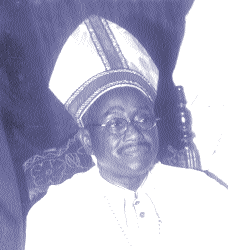


Posted by By Muyiwa Oyinlola on



At 61, Archbishop Sunday Ola Makinde, the Archbishop of Methodist Church of Nigeria, in charge of Lagos Archdiocese has spent more than three decades in the ministry.
At 61, Archbishop Sunday Ola Makinde, the Archbishop of Methodist Church of Nigeria, in charge of Lagos Archdiocese has spent more than three decades in the ministry. Although his childhood dream was to be a school teacher, he has found greater fulfillment and happiness in being one of the labourers in the vineyard of God. Hence, he has mastered the operating laws in the terrain that God has chosen for him.
There is hardly any subject in the Bible that he cannot talk authoritatively about, even 'miracle' upon which the essence of the Christian faith stands. However, this subject, which has at various times generated controversy among Nigerians, especially within the Christendom , is equally a source of worry to the Ibadan-born clergyman .
Makinde is of the opinion that "the Christian faith rests on miracle, the death and resurrection of Jesus Christ is a miracle, and it is upon that essence that Christianity stands as a faith." He also says, "but the way some pastors are going about it is like what you can call black magic."
The Wesley College trained teacher who turned a preacher 35 years ago also brings to bear his wealth of experience on the altar and the study of the Holy Bible as he speaks on sundry issues in Christendom.
Church growth and high crime rate
Archbishop Makinde is worried that there is no justification for the increasing number of churches and mosques in the country, as the crime rate is growing increasingly on a daily basis. Speaking specifically on his constituency, he says most of the so-called men of God have shifted attention from the spiritual growth of their flock to material consideration. "We are like the Israelites of the old, who believe in Religeousity, and not Christianity. What we have today is religion, we build cathedrals, we build edifices - mere physical structures that are of no importance to God. Our assignment as men of God is to build people who will be able to meet God at the end of the day."
If he has his way, he wants a situation whereby every preacher goes through seminary before embarking on evangelical activities.
"This is the way it is done in the traditional churches. It was like that until the commercialisation of churches. You can't wake up one day and say you have a leading to establish a church. There should be a period of training where you are exposed to the ethics of Christendom."
Churches and taxation
While there is clamour in some quarters that churches should be taxed based on the perceived huge amount of money at their disposal, Makinde opposes such move. "It cannot happen. I consider it a big joke that anyone can think of that. But this is the first time I am hearing about such a move. Whoever tries that will be invoking the wrath of God upon himself. Who are the people who will take the decision? Are they not those in government, who went to missionary schools and benefited from the system? Churches should pay taxes, to who?"
NBC and miracles
Much as he agrees that there is a need to sanitize the body of Christ in relation to the kinds of miracles that are displayed on television, he says such an exercise should be done with caution. "There should not be a blanket clampdown. Not all these miracles are fakes. Not all of them are genuine either. So, we should exercise caution. Unfortunately, we cannot carry out any laboratory experiment to determine the authenticity of any claim to miracle but, ‘by their fruit, you shall know them', that is what the Bible says. Miracle is part and parcel of Christianity. But some people have turned it into black magic, deceiving people thereby. We don't need to advertise miracle. Each time Jesus performed any miracle, he would tell the person, "Don't tell anybody,' or 'Go and show yourself to certain people.'
Take a little wine
The quotation is one passage from the Bible, which Makinde says "unbelievers" quote wrongly to suit their personal interpretation. Although some say the passage gives liberty to anyone who wants to drink alcohol to be moderate about it, he says those who have that notion are wrong.
"God is not an author of confusion. He cannot say you should drink and then go ahead to say you should not. Those who hide under that to drink are mere drunkards. They are only looking for excuses to back up their weakness. Only drunkards quote such a passage. If you are a Christian, you don't drink anything alcohol."

